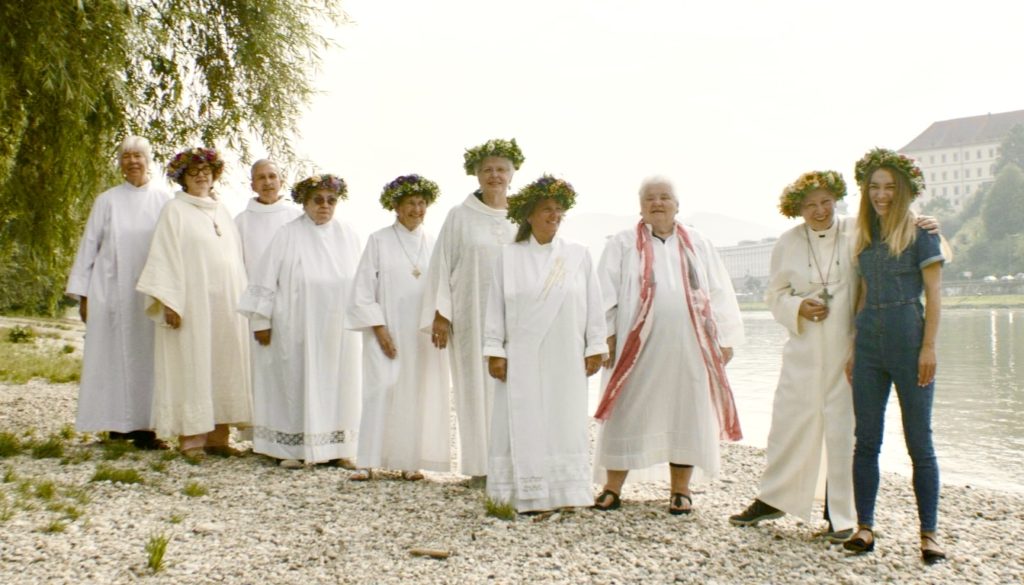Diagonale review: Girls & Gods (2025)
Diagonale
Documentary Competition

Eight years past the massive protests which spread from Washington DC to London and further to multiple countries across the world, “I can’t believe we still have to protest this shit.”, to quote a multitude of signs held by women and spurred by the 1st election of Donald Trump as president of the United States, still resonates. With the rise of right-wing governments in the Western world, the fight for gender equality is in great jeopardy. It seems like we are slowly moving backwards to a time of absolute restrictions and extremes, in which mentioning human rights and using the word “woman” alongside 198 others falls under censorship. It might have started with the USA, but will it stop there? In some other places, that fight is additionally burdened by either dictatorships or religious governments, which doesn’t stop women from demanding their rights and shake off the shackles of patriarchy. Monotheistic religions were and still are the mightiest tools of the patriarchy, but does being religious automatically exclude feminism?
In the logline of Arash T. Riahi’s & Verena Soltiz’s documentary Girls & Gods, we find the following description: In a groundbreaking personal journey, Inna Shevchenko meets extraordinary, inspiring women; some are fighting against religion, others defend religion, and surprisingly, many (have) started to reform religion. (…) Inna Shevchenko doesn’t need much introduction. The Ukrainian feminist attracted international attention with her activism as part of the collective Femen when she cut down a 4-meter high wooden cross overlooking Independence Square with a chainsaw in Kyiv, in 2012, in support of Pussy Riot. In the film, Shevchenko briefly meets Russian activist Nadya Tolokonnikova to reminisce about the beginning of two important feminist movements in the region and their motives for seizing radical methods to fight gender-based injustices. “The world would be a much nicer place if everyone were an activist”, says Tolokonninova, face initially hidden by Pussy Riot’s trademark pink balaclava. She speaks about the reasons for her arrest and charges of hooliganism in 2012 after the group’s notorious performance “Punk Prayer” in an orthodox church: “One of the reasons they put me in jail is because I was a feminist, saying that Feminism is hostile towards the Russian Orthodox Church. So, for the six months, the only thing I was allowed to read was the Bible.” Tolkonninova thinks that this was a form of torture and a conversion attempt, although she became equipped with many biblical quotes to counter the actions of those who claim to be believers but do not stick to God’s word.

In one scene, Schevchenko is seen giving a lecture in Amsterdam, presenting herself as a feminist, a hysterical and immoral woman, a witch, a sectarian, and a daughter of the devil: “According to some, I deserve to burn in hell. According to others, I need to be punished in the name of their god. And, of course – ‘the real women’ don’t need my feminism.” Reluctant to establish a dialogue between atheists, feminists, female theologists or clerics of different confessions and beliefs, she displays a genuine curiosity and patience that is briefly challenged during one encounter. Following this minor incident, she will claim to be on the same page with every woman because they will eventually come to join the cause. To return to another quote from the logline: “They all are united by one belief: Women are magnificent. No god – neither in heaven nor on Earth – may deprive them of their rights or subordinate them to men.”
In its examination of religion as the mightiest tool to subjugate women, the Femen icon travels to many cities to speak to members of religious communities or women who risked everything to get away from religion. Not all believers or even clerics side with the mainstream interpretation of the holy scriptures, as we see in the case of the first female Imam Seyran Ateş, the initiator of the LGTBQ+ friendly Ibn Rushd-Goethe mosque, a Swiss group of feminist theologians from across the Protestant-Catholic divide that wrote “A Woman’s Bible”, the Catholic pro-choice movement in New York, and the Roman-Catholic women’s priesthood movement in Linz. Their American member Shanon Sterringer, pastor and theologist, aspires to grow a women’s priest movement worldwide.
It would take a lot of space to name all the brilliant minds appearing in the documentary, be it in Paris, London, New York or here, in Austria. They come from all corners of the world, each with an interesting story to tell. Some have gone through the unthinkable horrors. Cartoonist Corinne Rey (Coco), who survived the Charlie Hebdo attack in 2015, still draws provocative cartoons and proudly says: “Long live blasphemy!” Kenyan-Somali poet Halima Salat recites her verses that question a masculine God, and Modern Gaeisha raps her “Take It Off Now” song against the hijab: “Stop this false modesty/ keep me under wraps/ how did we come to accept this crap?” In the same spirit, Iranian-American journalist and activist Masih Alinejad would love the west-splaining of hijab and its acceptance to stop.
“Make Love, Not Sharia” states one of the signs carried at the protests against radical Islamists, but at a Student debate at Durham University with the topic “Islam is Compatible With Human Rights”, Maryam Namazie, activist-council of ex-Muslims, activist and psychotherapist Dr. Shiva Mahbobi and Joseph Robertson fail to convince the majority that religion is a threat to human rights. It is, of course, a man who feels compelled to interrupt a female speaker to say that his human rights were attacked and presents himself afterwards as “a shocked individual from Indonesia, a country where people do not question religion”.
The film also bursts with artistic energy, and many unique works are being shown: a series of performances include Ina Loitzl’s “Monsteramus-Wir zeigen” (at MMKK) and “Lingua-Sprachlos” (inside the Klagenfurt Cathedral), Rada Akbar’s “Invisible Captivity” (at L’Espace de Femmes in Paris), “Hey Ayatollah I am A Woman” by Assad Bina Khani, “Pianola” exhibition by the stage scenographer and installation artist Bissane al Charif, likewise the exhibition “The Women of Morrocco: La Grande Odalisque” by Layla Essayadi at Lehman College Art Gallery in NYC, or – exhibited in the same place the series “Herstory” by Lizzy Alejandro and “Throne” by Fay Ku. Presented are also the artworks by Klara Kuchta (Mamco Geneva), a comic series “Aborto Libre” by Erre, and “Visual Prayer” – an installation by Hagit Hollander Shimoni at the Jewish Museum in Berlin. in.
There are way too many sous-chefs in Inna Shevchenko’s busy kitchen. They are all charismatic, but we barely get a chance to get to know them. Girls & Gods can be called a digital catalogue of contemporary feminist voices and a golden example of how people should communicate with each other.
Country: Austria
Language: English, German, French, Ukrainian
Year: 2025
Runtime: 105′
Script-concept: Inna Shevchenko
Directors: Verena Soltiz, Arash T. Riahi
DOP: Simone Hart, Anna Hawliczek
Editors: Lisa Zoe Geretschläger, Elisabeth Pucar
Sound design: Nora Czamler
Producer: Arash T. Riahi, Sabine Gruber, Peter Drössler
Co-producers: Rhea Plangg, Michael Katz, Veit Heiduschka
CEO Amka Films Productions, Amel Soudani
Co-producers: RSI Radiotelevisione Svizzera, Silvana Bezzola Rigolini,
Alessandro Marcionni & Giulia Fazioli
Music: Alicia Mendy, Baby Volcano, Anohni
Funding institutions Austria: Filminstitut, Filmfonds Wien, Filmstandort Austria
Television investment: ORF (Film/Fernseh-Abkommen), RSI (Radiotelevision svizzera) / SRG SSR
Cast: Coco “Moderne Geaisha”, Nicolle Rochelle, Maryam Namazie, Shanon Sterringer, Khadija Khan,
Christine Lumetzberger, Frieda Vizel, Halima Salat, Elisabeth Gangloff Parmentier,
Lauriane Savoy, Jamie L. Manson, Emily Capello, Avigaiyl Halpern, Leila Tauil,
Khola Maryam Hübsch, Lauren Booth, Rifka Simon, Vazista, Yasaman Aryani,
Masih Alinejad, Abdullah Al Andalusi, Shiva Mahbobi, Nadya Tolokonnikova,
Seyran Ates, Taslima Nasrin, Bertold Höcker, Lior Bar-Ami
















